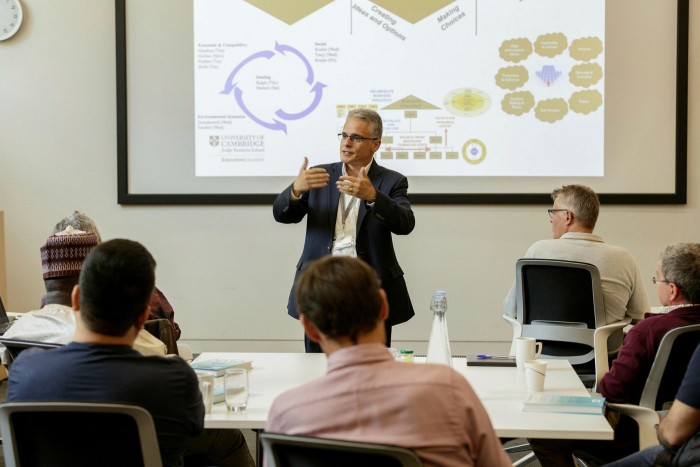Business leaders feel pressure to keep their skills up to date

Roula Khalaf, Editor of the FT, selects her favourite stories in this weekly newsletter.
Santiago Maestri used his expertise in marketing to build a chain of shops selling iPhone accessories across his native Argentina. But, as the global shift to online retailing accelerated during the coronavirus pandemic, he saw the need to return to school to learn more about data science.
“This is the language that companies are speaking right now,” he says. “You have to have the skills for the future. Clients are using lots of technology and I need to understand things like recommendation engines.”
This month, Maestri took part in a week-long crash course at London Business School alongside an international group of experienced managers. The topics discussed ranged from deeply technical questions to the commercial applications and managerial implications of big data.
Courses like this are part of a broader shift towards more frequent, specialist and life-long upskilling among senior executives, entrepreneurs and non-executive directors, as they seek to keep ahead of fast-moving business trends. Areas of concern include cyber-hacking, wellbeing and sustainability, with digital transformation among the top priorities.
“Companies are saying there is a ‘never normal’ now, with continuous change, ambiguity and volatility,” says Kanishka Bhattacharya, adjunct assistant professor of management science and operations at LBS, who helped lead Maestri’s course.

Even participants with a background in computer science gained fresh insights into the mathematical tools used to extract robust insights from masses of data, and how different varieties of artificial intelligence compare with one another.
But just as important were managerial skills — especially in a competitive market for talent, where recruiting and retaining specialists may mean abandoning top-down “command and control” structures. “Engineers now work with not for companies,” says Bhattacharya, describing a shift to “tribes and squads” of coders with deeper knowledge and sometimes higher pay than their managers.
The trend for senior-level upskilling is not confined to the private sector. For example, among the 25 participants on this month’s advanced management course run by the University of Cambridge’s Judge Business School were leaders from government departments and health and education providers — as well as executives as varied as the owner of a British eco-coffin business and a shipping manager from New Zealand.
Over three weeks, they discussed the factors driving global disruption for organisations, how to respond strategically, and how to develop their own leadership skills. Morning keep-fit sessions were intermingled with class discussions, workshops and individual mentoring.

“We want to explore the effects of unexpected geopolitical events and how senior people should respond,” says Stelios Kavadias, a Judge professor. “They reflect on the context so they can implement reform within their own organisation rather than trying to take ideas from elsewhere, which often doesn’t work and develops cynicism.”
After a brief lull in executive education during the pandemic, as companies cut training budgets and focused on adapting to remote working and sharp shifts in their markets, there is fresh appetite for such insights — and growing competition among education providers to cater to it.
A recent FT survey of chief learning officers (CLOs) showed that more than half expected their training budgets to be higher this year than last. Their motivations included the acquisition of new knowledge, as well as senior staff retention — and not least allowing executives to mix again in-person, off-site, following the Covid-19 lockdowns.
Leadership development was the most frequently cited area in which they sought training, followed by diversity and inclusion, digital transformation, change management, innovation and digital skills.
Over one-fifth highlighted wellbeing, resilience and sustainability as continuing themes.
Meanwhile, business schools report rising demand from alumni to hear insights from faculty during reunions — or increasingly to sit in on classes offered to current students — as they seek to keep up to date.
But, with costs under pressure, and demand for innovation in content and format, the schools are themselves facing disruption from competitors including digital start-ups.
The FT survey showed that many CLOs were partnering with individual consultants, training companies and online platforms, such as LinkedIn, to provide programmes for their executives.
Patrick Dunne, a consultant with varied for-profit and non-profit experience who provides training for boards, says the appetite for continued upskilling reaches right to the top of organisations. Even non-executive directors are seeking to benefit from workshops, simulations, and peer-to-peer advice.
“There is a shift that is creating a very different type of leadership that combines culture, purpose, values, and style,” Dunne says.
He argues that, in the past, boards have been able to hold managements to account based on pre-agreed budget and strategic plans. By contrast, “the modern world is satnav: you know where you are going but the weather may change or there are roadblocks, so you don’t know how you’ll get there. Directors need to cope with uncertainty and hold executives to account in a different way.”
For many, including Maestri, the opportunity to network with fellow executives, guest speakers and professors who are also practitioners is a key benefit of upskilling. “Why travel 40 hours to London for these courses? [Because] it’s not only a very good level of education, it’s also the people,” he says.
His most recent programme gave him introductions to coders in India. He is already making plans to return for more courses as he seeks to keep up.
Comments